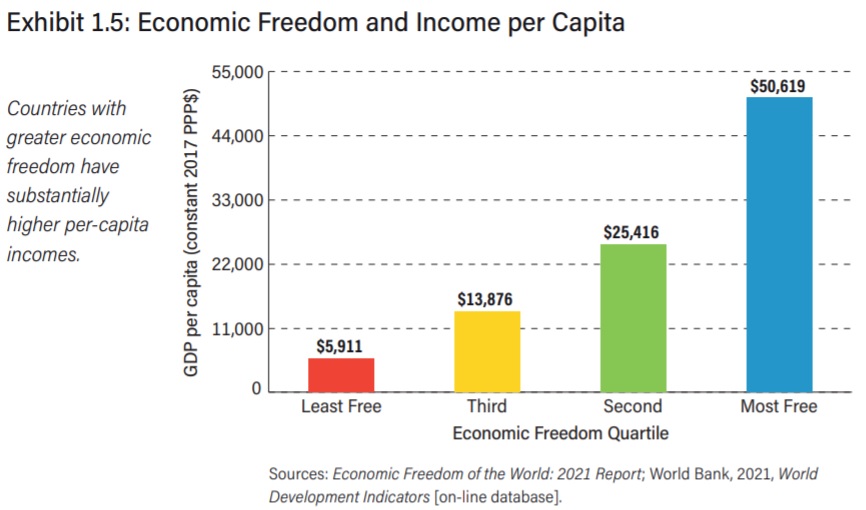As illustrated by the “anti-convergence club,” there is a very strong relationship between economic liberty and national prosperity.
Simply stated, people enjoy much higher levels of income in nations where there’s more free enterprise and less government.
But not everybody understands this relationship.
And it’s not just a problem on the left.
There are movements on the right (national conservatism, compassionate conservatism, kinder-and-gentler conservatism, common-good capitalism, reform conservatism) that apparently think bigger government will produce positive outcomes.
For a very recent example, Chris Griswold asserted earlier this month in Newsweek that Republicans should reduce their infatuation with economic liberty.
American workers are intensely tired of getting, well, railroaded by libertarian economic ideology that treats them as cogs in the free-market machine rather than human beings whose dignity, family lives, and communities matter. And they want an economic agenda that will do something about it. It is the task of responsible conservative leaders to articulate such an agenda. …Capitalism only works when pursuing profit results in investment in domestic production and employment. When the pursuit of profit leads instead to offshoring, reckless financial speculation, and the destructive exercise of monopoly power, it’s time for public policy to step in. …The great mistake of Republican policymakers in recent decades has been to confuse their policies for principles, as if “Tax Cuts” and “Free Trade” are the essence of conservatism and must be upheld regardless of circumstances. …Many working families are weary of economic policy that treats them as disposable. The political party that best responds to them stands to earn the support of a governing working-class majority.
I actually laughed out loud when reading the above column. How can anyone who lived through the big-spending Bush years or the big-spending Trump years think that Republicans in recent decades have been motivated by “libertarian economic ideology”?
But the bigger problem with the article is that Griswold apparently thinks that there’s an alternative to “free markets” that would produce better results for the working class.
You’ll notice he offers no evidence for that assertion. That’s because all the evidence clearly shows that you get more prosperity where government plays a smaller role.
What we should be doing, of course, is helping workers by getting government out of the way.
Scott Lincicome’s column in today’s Wall Street Journal correctly summarizes some of the best ways of making that happen.
‘Standing up for the American worker” has long been a slogan synonymous with bigger government in Washington. …this pro-worker chorus has become loud and bipartisan—trumpeting tariffs, wage subsidies, benefits mandates and stricter labor regulations. Its champions have coalesced on the assumption that “free markets” have failed the working class. …the claim that markets have failed American workers ignores the panoply of federal, state and local policies that distort markets and raise the cost of healthcare, child care, housing and other necessities; lower workers’ total compensation; inhibit their employment or personal improvement; and deny them the lives they actually want. …modest changes to existing regulations would lower child-care prices by thousands of dollars with little effect on quality. …eliminating tariffs on food, clothes, shoes and other household essentials would increase parents’ real incomes even more. …reforming housing, licensing, criminal justice, K-12 education, welfare and other harmful policies would boost workers’ mobility, bargaining power and lifetime earnings. …many in Washington think of American workers as helpless, static and in need of government protection from cradle to grave, despite their registered preferences and the documented harms that such policies as European-style labor regulations can inflict on them and the U.S. economy more broadly.
Amen.
People who think more government is the answer have obviously asked a very silly question.
Speaking of questions, maybe Mr. Griswold can be the first person to successfully answer this question. I won’t be holding my breath.



